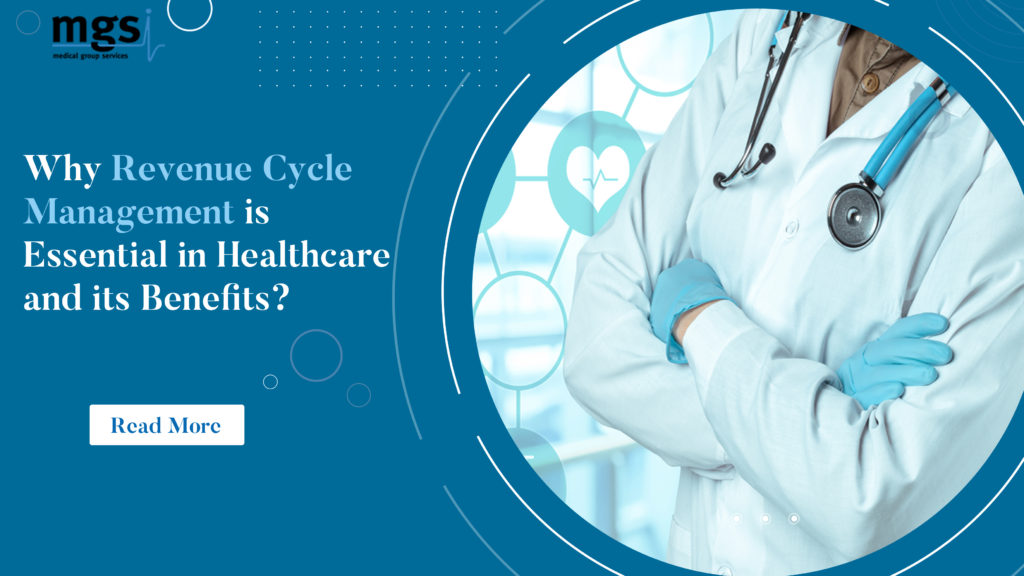
The objective of Healthcare and its benefits is mostly gauged basing patient care, satisfaction, medical facilities and specialties the medical practice and physician can offer. However, the requirements of the physician and the medical practice in terms of their financial needs and achievements, business goals, claims processing and medical reimbursements are seldom considered. Nevertheless the obligations and struggles involved in smooth and profitable medical billing process is obvious; proving Why Revenue Cycle Management is Essential in Healthcare and its benefits are evident.
Medical billing can be time consuming and cumbersome for physicians to handling alongside patient care therefore efficient Revenue Cycle Management (RCM) is crucial in healthcare for several reasons. Here are some of the key benefits and reasons why RCM is essential:
- Revenue Optimization
- Financial Stability
- Cost Control Enhanced Cash Flow
- Patient Satisfaction
- Regulatory and Compliance
- Performance Monitoring
- Data Analysis and Constant audits
RCM ensures the financial stability of healthcare organizations by effectively managing the entire revenue cycle. It involves processes such as patient registration, insurance verification, claims submission, payment posting, and collections. By streamlining these processes, RCM maximizes revenue and reduces financial leakage, ultimately improving the organization’s financial health. Explained below in detail why RCM is essential in healthcare and its benefits.
Revenue Optimization
RCM helps healthcare providers optimize their revenue by minimizing claim denials and reducing the time taken for reimbursement. It ensures accurate coding and documentation, timely claims submission, and follows up on unpaid or denied claims. By optimizing revenue, healthcare organizations can invest in better infrastructure, technology, and patient care.
Financial Stability
Effective RCM processes facilitate the timely and accurate billing of patient services, leading to improved cash flow. Prompt and accurate claims submission reduces the time between providing services and receiving payment. It helps healthcare providers meet their financial obligations, such as paying staff salaries, purchasing equipment, and maintaining operations.
Cost Control
RCM helps control costs by reducing administrative expenses, eliminating billing errors, and minimizing claim rework. It streamlines workflows, automates repetitive tasks, and reduces the need for manual intervention. Effective RCM also helps identify areas where expenses can be optimized and resources can be allocated more efficiently.
Regulatory Compliance
RCM ensures healthcare organizations adhere to the complex regulatory guidelines and billing requirements set by government agencies and insurance companies. Non-compliance can result in claim denials, penalties, and legal issues. RCM professionals stay up-to-date with the evolving regulations, codes, and billing practices to ensure compliance and mitigate risks.
Data Analysis and Performance Monitoring
RCM involves the collection and analysis of data related to revenue, claims, and reimbursement. This data provides insights into the financial performance of the organization, identifies areas for improvement, and helps in making informed decisions. Performance monitoring enables the identification of bottlenecks, process inefficiencies, and opportunities for revenue enhancement.
In summary, Revenue Cycle Management is essential in healthcare as it ensures financial stability, And partnering with an established Medical Billing Service provider can be the best solution.
About MGSI
MGSI has over 28+ year of expertise in healthcare revenue cycle management services with over 600+ physician as clients across the U.S. With multi-specialty experience and software expertise, MGSI offers complete RCM services with guaranteed benefits. To know more about MGSI call 1-877-896-6474 or log on to Revenue Cycle Management: Healthcare Services for Physicians (mgsionline.com)
